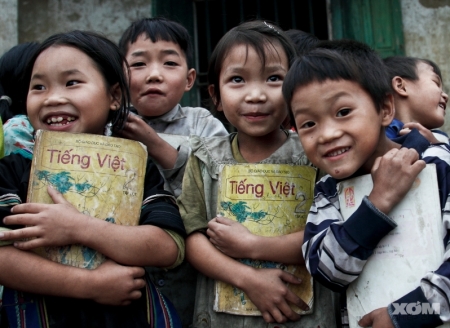What will it take to end poverty in Vietnam?

What will it take to end poverty in Vietnam?
A few months ago, I journeyed to Lao Cai, a predominantly ethnic minority area in Vietnam’s Northern Mountains, to supervise a pilot survey. One older man I encountered—typical of many we saw—was a subsistence farmer with minimal education who spoke only his native language and had barely ventured beyond his village.
Members of ethnic minority groups make up 15 percent of the country’s population but account for 70 percent of the extreme poor (measured using a national extreme poverty line). During Vietnam’s two decades of rapid growth, members of ethnic minority groups in the country have experienced overall improvements in their standards of living, but their gains have lagged behind those of the Kinh majority.
Why is ethnic minority poverty persistent? This has been the subject of numerous studies, including a 2009 study on ethnicity and development in Vietnam as well as a chapter in our more recent Vietnam Poverty Assessment. This is also one piece of the research my team is currently pursuing.
I have been struck by how much the situation of ethnic minorities in Vietnam resembles that of indigenous people a world away, in Mexico, where I lived for a year while working on my dissertation. In both countries, the groups are highly diverse, make up similar fractions of the country’s population, and face similar challenges. Indeed, the best comparative global study (by Gillette Hall and Harry Patrinos) I’ve seen on the issue finds surprisingly common profiles of indigenous/ethnic minorities around the world.
My list of inter-related factors behind high poverty of ethnic minorities in Vietnam would include:
- Geographical isolation and limited market access,
- Social exclusion, culture, and language,
- Limited access to quality land,
- Low rates of out-migration, and
- Low levels of education.
Similar factors would apply to indigenous groups in many countries.
I am optimistic that at least some of the underlying causes of ethnic minority poverty are becoming less important over time. Education levels have risen for recent generations of ethnic minority children. This means more are learning the Vietnamese language, which will enable them to connect via markets and migration with the country’s broader prosperity.
I saw signs of this on my trip to Lao Cai: Although the older man I described earlier has very limited connections beyond his village, his children who are in their 20s spoke fluent Vietnamese and have travelled widely for work. I expect that as this generational shift continues and networks for ethnic minorities spread, we will see increasing numbers leaving the family farm to seek and find opportunity elsewhere.
A couple weeks ago I went on a tour with my team to four universities across Vietnam to present the Vietnam Poverty Assessment. Our talks generated lively discussions, and we polled participating students and faculty via SMS for their views on the best way to reduce ethnic minority poverty. My colleague Ngoc Nguyen ran the poll off her laptop using the open source software FrontlineSMS. Improving access to markets and offering free education were the most popular responses, and many offered their own free text “other” responses.

Thinking about ethnic minority / indigenous poverty in Vietnam or in your own country, how would you have responded to this poll? Please share your ideas with us in comments.
GABRIEL DEMOMBYNES – WB